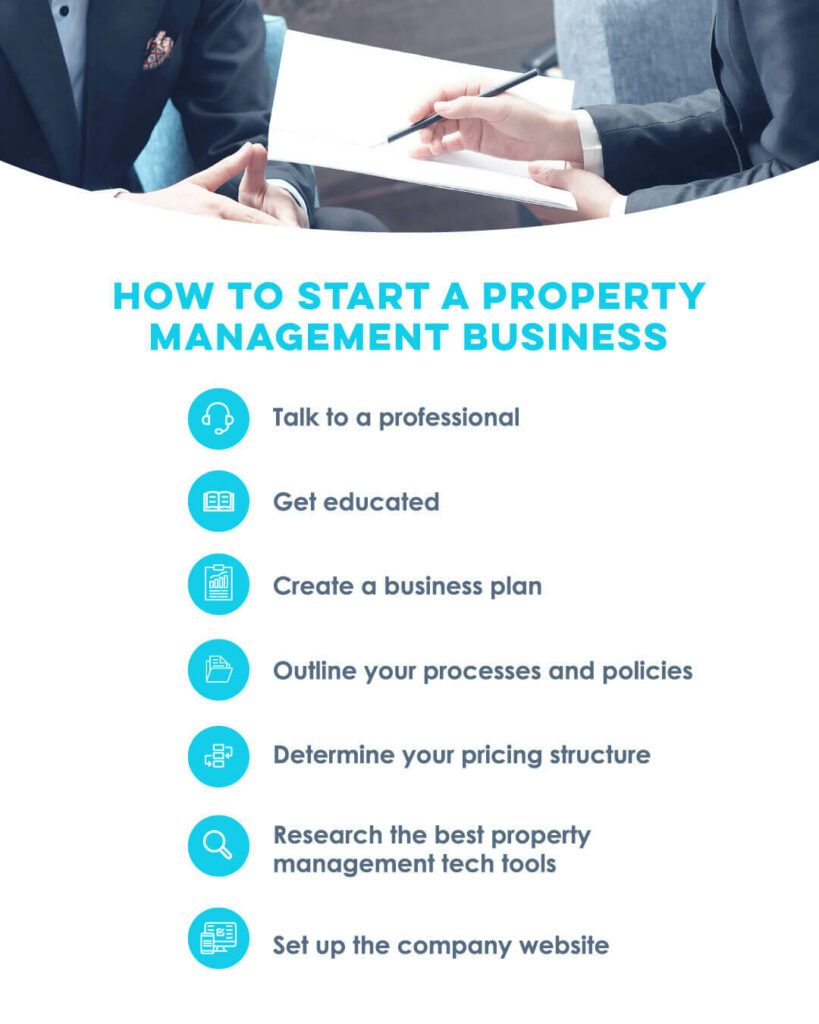June 7th, 2019
52 ways to grow your rent roll
Property Management
Property Management

Whether you’ve been a property manager for years and are looking to go out on your own, or you’re just curious about the process, opening up a property management business can seem like a monumental task.
To help you find a place to start, below are six things to do when starting a property management business.
Start by getting in contact with a business adviser or expert. A business adviser’s job is to provide you with information about how to get started and run you business as efficiently as possible.
They’ll also be able to help you to determine your business structure, i.e. if you are more likely to be a sole trader or need to set up a partnership, trust or company, they can also let you know if you require an Australian Business Number (ABN) and provide guidance on how to register and launch your business. To get you started, the Australian Government provides the ability to chat to a business adviser over the phone or face to face.
You can also tap into the knowledge of any industry experts that you may know. Take a look at your Linkedin network and search for any real estate professionals who you may be connected with who can offer some industry knowledge and advice.
If you have a good relationship with the property manager for your own residence, see if they might be available for a meeting in which you can brainstorm and share advice.
To own a property management business in New South Wales (NSW), you’ll require a corporation property licence. To be eligible for a corporation property license, you will need:
Property management is governed by conduct rules that are held under the Property, Stock and Business Agents Regulations 2014 (NSW). Other States have equivalent legislation, such as the Property Occupations Act 2014 (QLD) and the Estate Agents Act 1980 (VIC).
In most states, licensees must hold clients’ funds in a trust account, requiring you to open a trust account in the business name. There are a number of trust account requirements which you would need to ensure you are aware of and understand.
For example, in NSW only a licensee in charge may authorise trust account withdrawals from a trust account. Requirements will vary from state to state so this would need to be investigated and properly understood before opening an account.
A good business plan can help you secure finance, define the direction of your business and create strategies to achieve your goals. A business plan usually consists of a rough overview of the business, the market, future and financial projections.

Your business summary should focus on your vision for the business and why you envision it to be successful. This portion will outline things such as your business and registration details, organisation chart, insurance, risk management, legal consideration and operations.
In the market portion of your business plan, you can start by reviewing property sites such as realestate.com.au, domain.com.au and even the websites of your competitors. Tally up the listings by competitors and track those things over the year. You should include what statistical research you’ve done to analyse the market, outline your planned sales targets and define who your target customer demographic is.
Additionally, consider your unique selling proposition, which focuses on the strengths and distinctive benefits of your business. What makes your business different from your competitors? This will help set your business apart when marketing to potential clients and can help you justify a premium price.
This should include your business’ vision statement, which briefly outlines your future plan and overall goals for your business. You can also include how you plan to achieve this vision, your short and long term goals and an action plan for all of these to come to life.
This is the part where you can list your key financial objectives, these can be in the form of sales or profit targets. You can also detail any finance that is required, ie. how much money you would need upfront, where you will obtain these funds etc.
The beauty of having your own business will be creating all of your processes and policies in the exact way that you would want them. Spend some time outlining the processes that need to be put into place.
For example, how will you lease a property end-to-end? Focus on the desirable end goal of the process and document the most efficient steps in order to get there. Consider creating standardised checklists, as having a procedure for staff members to follow is a great way to ensure consistency and accuracy.
You can also outline a few scenarios of situations which are likely to occur:
This is going to help you have a clear understanding of how unexpected situations will be managed, and when new staff are brought on to the team they will be able to easily see how to manage the same situations.
There are a number of services that you can charge for as a property manager. If you have been a property manager for some time, you likely have a rough idea of what fees are regularly charged. The most common usually include:
There are also many miscellaneous fees and charges floating through the industry which you will need to decide if you will implement. These include lease renewal fees, tribunal fees, break lease amendment fees, lease agreement fees, annual statement fees and routine inspection fees, just to name a few.
Enquire with the available property management software providers to find a property management platform that best suits you. Cloud-based solutions such as PropertyMe can simplify your workload with automated workflows and help you reduce your bottom line.
You’ll also need to do some research on what software or hardware you’re going to use for file storage, internal communications, customer relationship management, social media scheduling, creating collateral, e-signatures, payments and more.
Your website is essentially the virutal front door of your business. You will need a domain name, a service that hosts your website and a content management system. If you decide to build the website yourself, platforms such as Squarespace and Wix advertise the ability to easily design, customise and publish your own website.
You can also outsource the task to a website designer and developer. If you decide to go ahead with this, make sure you have have a rough idea of the imagery and copy that you want on the website. Then provide a website design brief with an overview of your property management business and address what you want your website to do and what you would like it to achieve.
After your business has been established and launched, make sure to continue to network and grow your property management business.
Here are six things to do when starting a property management business:

Thanks for reading this blog on how to start a property management business! You might also be interested in:
Let us know your thoughts on how to start a property management business by emailing [email protected].